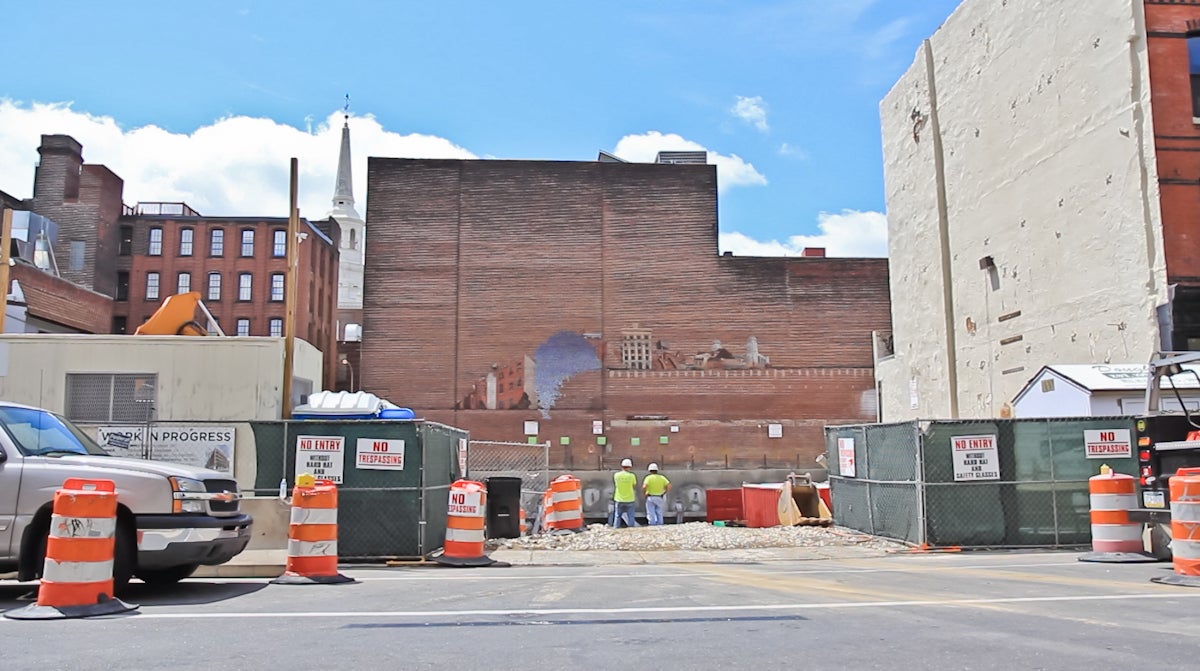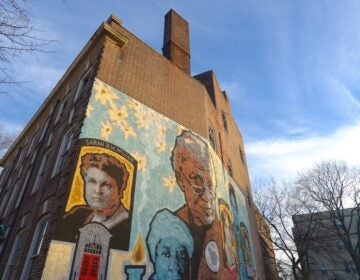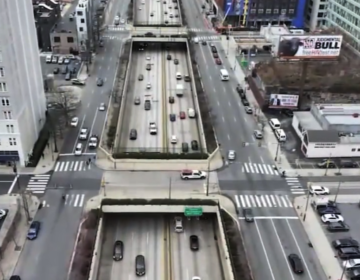‘It’s far too important’: Judge requests more details from developer on proposed handling of Arch Street remains

Site of the development at 218 Arch Street Monday morning. (Kimberly Paynter/WHYY)
A Philadelphia judge has given a property developer ten days to come up with a better plan to excavate, transfer and rebury historic human remains that it has found at its private construction site in old city. The directive came during an emergency hearing in Orphans’ Court Monday afternoon.
The human remains, first discovered last fall, have been traced to a Baptist cemetery that dates back to the 1700s. They were supposed to have all been moved decades ago to Mount Moriah Cemetery. But as construction workers continued digging the foundation for a new building on Second and Arch Street, they’ve hit lots more bones and coffins that hadn’t been removed.
Since March, the developer, PMC, has been working with volunteer archeologists from Rutgers and elsewhere who wish to preserve and study the remains. But as more bones continue to be uncovered on the site, questions loom over how they’ve been handled.
At the request of the city, PMC recently brought in an archeology firm, AECOM, to oversee the current excavations. As part of that process, PMC recently filed a petition in Orphans’ Court, seeking official permission to excavate, transfer and ultimately rebury the remains.
“We’ve done everything we believe has been required from us and then some to do the right thing,” PMC’s executive vice president, Jonathan Stavin, said in court.
PMC has offered to remove and reinter the remains at Mount Moriah, Stavin said, and in the meantime transfer them to the volunteer archeologists for further study.
Mark Zecca, a former city solicitor who has been working with concerned archeologists from the Philadelphia Archeological Forum, had questions during the hearing about the process and the lack of public oversight. He says the city should be involved from the get-go with such burial grounds, especially when individuals, alive or deceased, aren’t able to speak up. He also contended that notices should be issued and attempts made to reach out to interested parties.
“Bones that are in a cemetery are not abandoned,” Zecca said after Monday’s hearing. “They’re held in trust by the cemetery. They’re not the property of the person that owns the land. Therefore, this court has the power to do the right thing, to make sure all proper rights are respected.”
Because the current project is privately funded and on private land, representatives with the city and the state both reiterated in court Monday that they didn’t need to be involved, that it wasn’t under their authority nor was it their responsibility to intervene based on current burial laws.
The judge, Matthew Carrafiello, gave PMC ten days to work out an “approriate proposed decree” that would involve consulting with Zecca. Carrefiello stressed to all parties how important it is to safeguard the remains.
“It’s far too important,” Judge Carrefiello stated at the close of the hearing. “I want to know how this is going to play out.”
WHYY is your source for fact-based, in-depth journalism and information. As a nonprofit organization, we rely on financial support from readers like you. Please give today.




